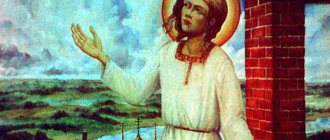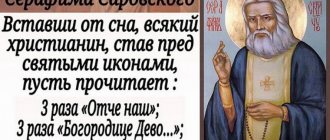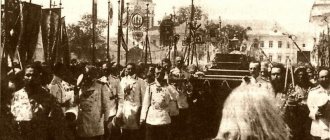Instructions and teachings of Seraphim of Sarov
The great ascetic of the Russian land, known perhaps to every Christian from the royal chambers to the peasant hut, left valuable teachings to his descendants. To this day, they remain relevant and help Orthodox people seeking God to find clear life guidelines leading to salvation in eternal life.
Icon of Seraphim of Sarov
This is what the God-bearing elder taught:
- “Heaven and hell begin on earth.”;
- “Judge yourself, and the Lord will not judge.”;
- “Find peace in your soul, and thousands around you will be saved.”;
- “Take away sin, and illnesses will go away, for they are given to us for sins.”;
- “You can take communion on earth and remain not communion in Heaven.”;
- “Whoever endures an illness with patience and gratitude is credited with it instead of a feat or even more.”;
- “No one has ever complained about bread and water.”;
- “Buy a broom, buy a broom, and sweep your cell more often, because as your cell is swept, so will your soul be swept.”;
- “More than fasting and prayer is obedience, that is, work.”;
- “There is nothing worse than sin, and nothing is more terrible and destructive than the spirit of despondency.”;
- “True faith cannot be without works: whoever truly believes will certainly have works.”;
- “If a person knew what the Lord had prepared for him in the Kingdom of Heaven, he would be ready to sit in a pit of worms all his life.”;
- “Humility can conquer the whole world.”;
- “Out of joy a person can do anything, but out of inner stress - nothing.”;
- “The abbot (and even more so the bishop) must have not only a fatherly, but even a motherly heart.”;
- “The world lies in evil, we must know about it, remember it, overcome it as much as possible.”;
- “Let there be thousands of those who live with you in the world, but reveal your secret to one out of a thousand.”;
- “If the family is destroyed, then states will be overthrown and nations will be perverted.”;
- “As I forge iron, so I have handed over myself and my will to the Lord God: as He pleases, so I act; I don’t have my own will, but what God pleases, that’s what I convey.”;
- “This one is on good soil, this one is on the sand, this one is on a stone, this one is along the way, this one is in thorns: everything will vegetate somewhere and grow, and bear fruit, although not soon.”;
- “Ah, if you knew, beloved, what joy, what sweetness awaits the righteous in Heaven, then you would decide to endure sorrows with thanksgiving in your temporary life. If this cell itself were full of worms, and they would eat our flesh all our lives, then even then we would have to endure with all thanksgiving, so as not to lose that heavenly joy...”;
- “The acquisition of the Spirit of God is the true goal of our Christian life, and prayer, vigil, fasting, almsgiving and others done for the sake of Christ are only means to acquire the Spirit of God.”;
- “The soul must be supplied with the Word of God, for the Word of God is the bread of angels, and the ears that hunger for God are fed with it. Most of all, one should practice reading the New Testament and the Psalter. From reading the Holy Scriptures, there is enlightenment in the mind, which is therefore changed by the Divine change. You need to train yourself in such a way that your mind seems to float in the Law of God, according to the guidance of which you should organize your life. It is very useful to engage in reading the Word of God and, in solitude, to read the entire Bible intelligently. For one such exercise, the Lord will not leave a person with His mercy, but will fulfill the gift of understanding.”;
- “Our life is the sea, the Holy Orthodox Church is our ship, and the Helmsman is the Savior Himself.”;
- “Those who truly decide to serve the Lord God must exercise the memory of God, saying with their minds: “Lord Jesus Christ, Son of God, have mercy on me a sinner.” Only those who have inner work and watch over their souls receive gifts of grace.”;
- “Just as we sinners cannot look at the light of an angel, so it is terrible to see demons, because they are vile.”;
- “When there is tenderness in the heart, then God is with us.”;
- “Silence brings a person closer to God and makes him, as it were, an earthly angel.”;
- “My joy, I pray you, acquire a peaceful spirit, and then a thousand souls will be saved around you...”;
- “The human heart is open to the one Lord and there is only one God, the Knower of the Heart: but a man comes, and the heart is deep.”;
- “Passion is destroyed by suffering, either voluntary or sent by Providence.”;
- “Just don’t eat anything to your fill, leave room for the Holy Spirit.”;
- “The Kingdom of God is in the heart of man.”
Read about the saint:
- Source of Seraphim of Sarov in Diveevo
- Feast of Seraphim of Sarov
- Church of Seraphim of Sarov in Kuntsevo
How to read the prayer rule
There is a special order for how to read the prayer rule of Seraphim of Sarov. The monk called on all laity to follow him if they strive to lead a righteous life and be sincere Orthodox. The prayer rule of St. Seraphim of Sarov is required to be read as follows:
- Start the day by reading morning prayers. To do this, a layman needs to stand in front of the icons, make the sign of the cross and thank the Almighty. Then begin to read the morning prayer rule of Seraphim of Sarov.
- If a woman reads prayer at home, she must wear a headscarf. The same applies to girls who are attracted to the Orthodox faith. Boys and men, as in the temple, are allowed to pray without a headdress.
- After completing the reading of the prayer rules, ask God for blessings on the beginning of the day. After that, go to work, study or other worldly affairs.
- In the evening, thank the Almighty for your day by reading the evening prayer rule of Seraphim of Sarov, as well as the prayer “May God rise again.” At the end, make the sign of the cross on all four corners of the room and only after that go to bed.
The Monk Seraphim of Sarov noted that the laity should not forget throughout the day, as soon as they have a free minute, to turn their words of prayer to the Lord, even if they are very short. While working, on the road, it is enough to say: “Have mercy on me, a sinner,” or “Have mercy on me, a sinner.” This is necessary so that a person does not forget about the need to lead a righteous and honest life.
The rule for the laity is what prayers should be read every day. About this at the link.
Seven teachings of St. Seraphim of Sarov
The venerable elder expressed many wise thoughts that contain a simple truth - those who have failed to gain hope in God cannot find peace in their soul. This is one of the main principles that guided the saint himself.
Book of instructions by Seraphim of Sarov
There are seven of his most important teachings, which are given below:
- About faith. According to Sarovsky, whoever truly believes in God certainly does things. The holy ascetic went to live in the thicket of the forest, five kilometers away from the monastery. He worked a lot in his garden, which was built next to his cell. He got his own food. I read a lot of spiritual literature and stayed awake much longer than I slept;
- About hope. St. Seraphim argued that all who have hope in God are raised to him and enlightened by the radiance of eternal light. From the life of the elder it is known that he was sick in childhood. Once in a dream, the Virgin Mary appeared to little Prokhor (that was the name of the saint in the world) and promised that he would be healed. During the procession of the cross, which walked past the Moshnins’ house, the mother hastened to carry out her son and placed him next to the icon of the Sign of the Most Holy Theotokos. After this, the boy began to recover;
- About silence. The elder said that it is silence that contributes to the acquisition of inner peace. And it is necessary to talk as much as possible with yourself and the Lord, and less with others. From 1807 to 1810, Sarovsky himself took a vow of silence and tried not to communicate with anyone. Returning to the monastery, he remained in seclusion for fifteen years. Only after this period did he begin to receive visitors. It is known that Tsar Alexander I even came to him. For his monastic exploits, Seraphim of Sarov acquired the gift of clairvoyance and miracle-working. He also said that from solitude and silence tenderness and meekness are born;
- About patience. The saint taught that everything that happens in life must be accepted with humility and gratitude to God. There is an indicative moment in the elder’s life story that confirms the monk’s commitment to this belief. When Seraphim lived in the forest, he was attacked by robbers for the purpose of robbery. There was a rumor that the hermit was visited by wealthy guests, therefore, he had something to take away. The attackers attacked Seraphim during prayer, hitting him on the head with an ax head. He barely survived, but became very hunched over. The elder believed that only bad deeds can be condemned, but not the person who does them. After all, there is only one judge who will judge everyone - God;
- About the spiritual world. Sarovsky said that we all need to maintain peace in our souls in every possible way, not to be offended and to restrain our own anger. Contemporaries of the great ascetic called him the most striking example of freedom from anger. Returning to the story of the robbers, it is worth noting that the elder forgave his offenders when they were captured and asked not to punish them. He considered the best means of taming anger to be the desire to acquire a “joyful spirit, not a sad one” and get rid of despondency;
- About the post. The saint taught that true fasting is not just exhaustion of the flesh. The point is, first of all, to give a piece of bread, which you were going to eat yourself, to someone who is hungry for it. He noted that the saints never entered into fasting suddenly. This is done gradually, and in the end a person learns to be content with the least. Seraphim of Sarov, living in the forest, ate herbal food for three years, as his biographers claim. At the same time, the monk emphasized that the holy fasters did not know relaxation, but were always distinguished by their cheerfulness and readiness for action;
- About boredom. The elder also paid attention to this topic, saying that boredom usually overtakes a monk by midday, causing him to become disgusted with his place of residence and the monastic brethren. The only way to get rid of this illness, which goes hand in hand with sadness, is fervent prayer and fulfillment of assigned obediences. When there is order in your classes, boredom will not find a place.
Why is a prayer rule necessary?
In the Russian Orthodox Church there is still a practice of turning to the Almighty in prayer every day, even if a person stays at home and does not visit church. This type of prayer is also called private prayer. It is customary to read morning and evening texts, various sequences and canons. In general, all this is called a prayer rule, which can be thematically divided into several parts.
If you follow the Christian tradition, fulfilling this rule is a prerequisite for the full life of an Orthodox person in faith to God. A prayer rule is necessary to correct the soul of a parishioner.
The Orthodox Church initially noted the need for the laity to follow certain prayer rules. This is a tradition that dates back several centuries. At the same time, many modern preachers and holy fathers, who determine what the behavior of parishioners should be, believe that an informal attitude to this process can now be allowed.
Saint Theophan the Recluse wrote that the rule is not an essential and defining part of prayer, but only its external side. The main and fundamental thing remains the sincere prayer of the mind and heart, addressed directly to the Almighty. It must be offered with praise, supplication and thanksgiving for everything that man has received from the Lord. Only when the words come from the heart can a prayer be considered sincere and true. If there are no spiritual impulses, prayer will not work, even if a person repeats sacred texts all day.
The prayer rule calls on the laity to turn to the Lord with short prayers throughout the day, without even visiting the temple. But this does not mean that sacred texts should simply be muttered or “read out”, as some Orthodox Christians do. What becomes decisive is the need for a Christian to feel prayer, to feel the need to say it, to structure his life so that it becomes the norm of his spiritual life.
“Reading a prayer” should not become an obstacle to the prayer itself. Of course, many find it difficult to put sincere feelings and thoughts into texts written by other people. However, it is worth realizing that the prayers were composed by saints who lived many centuries ago. These were people who had rich practical experience in Communion with God. Therefore, if we thoughtfully and carefully consider these texts, they will be able to tell us a lot about ourselves; with the proper spiritual aspiration, we can see the consonance with our own feelings, sensations, and ideas about the world.
Discussing the meaning of the prayer rule, this is exactly what Metropolitan Anthony of Sourozh writes about. He encourages the laity to ask themselves questions. Determine what I myself know about chastity, how I imagine humility, what love is for me, and be interested in many other similar spiritual questions. If a Christian begins to carefully think through each such thought, then over time he will feel a family connection with those saints who composed the words of spiritual texts and chose them to express their spiritual experience.
At the same time, all Orthodox clergy emphasize that no one requires a believer to limit prayer only to the words of others. In particular, Theophan the Recluse writes about this. He emphasizes that the prayer rule is designed to help a person understand himself, correct his inner world in order to discipline the soul, and find in the depths of himself the readiness and desire to follow the Savior in everything. For example, in prayers related to the morning rule, the fundamental theme is an appeal to the Almighty with a request for help for any good deed that is planned to be performed on this day. You should also ask to strengthen your spirit and your own faith, to be ready to meet the Lord. We must remember that the Gospel says that every person must stay awake, because he does not know when the owner of the house will come.
The rule of St. Seraphim of Sarov for the laity in the video:











